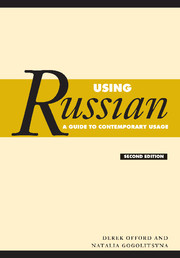Book contents
- Frontmatter
- Contents
- Preface to the first edition
- Preface to the second edition
- Acknowledgements
- Sources
- Note on transcription, stress marks and transliteration
- Glossary of linguistic terms
- List of abbreviations
- 1 Varieties of language and register
- 2 Passages illustrating register
- 3 Problems of meaning: Russian words
- 4 Problems of translation from English into Russian
- 5 Vocabulary and idiom
- 6 Language and everyday life
- 7 Verbal etiquette
- 8 Word-formation
- 9 Inflection
- 10 Prepositions
- 11 Syntax
- 12 Stress
- Index of Russian words, phrases and affixes
- General index
12 - Stress
Published online by Cambridge University Press: 05 June 2012
- Frontmatter
- Contents
- Preface to the first edition
- Preface to the second edition
- Acknowledgements
- Sources
- Note on transcription, stress marks and transliteration
- Glossary of linguistic terms
- List of abbreviations
- 1 Varieties of language and register
- 2 Passages illustrating register
- 3 Problems of meaning: Russian words
- 4 Problems of translation from English into Russian
- 5 Vocabulary and idiom
- 6 Language and everyday life
- 7 Verbal etiquette
- 8 Word-formation
- 9 Inflection
- 10 Prepositions
- 11 Syntax
- 12 Stress
- Index of Russian words, phrases and affixes
- General index
Summary
Introductory remarks
Most Russian words have fixed stress, but many do not and it is these that give difficulty to the foreign learner. Stress patterns are numerous and complicated, but the student may take some comfort from the fact that there are patterns.
In this chapter we first set out the main patterns of stress in Russian nouns, adjectives and verbs and then indicate some of the deviations from standard stress that may be encountered.
Stress in Russian is very important for two reasons. Firstly, it is strong. Therefore a word pronounced with incorrect stress may not be understood. Secondly, there are many homographs which are distinguished from one another only by means of stress and consequential pronunciation of unstressed vowels, e.g. вéсти, news, and вести́, to lead; мóю, I wash, and мою́, my; плáчу, I cry, and плачу́, I pay; слóва, of the word, and слова́, words.
It should be remembered that in some words e will change into ё when the syllable in which it occurs attracts the stress.
Conversely ё will change into e when the syllable in which it occurs loses the stress (as it does in some perfective verbs bearing the prefix вы́-, e.g. вíшел, I/he went out, in which the element шёл has lost the stress that it normally bears (as in пошёл, I/he went)).
- Type
- Chapter
- Information
- Using RussianA Guide to Contemporary Usage, pp. 433 - 454Publisher: Cambridge University PressPrint publication year: 2005



